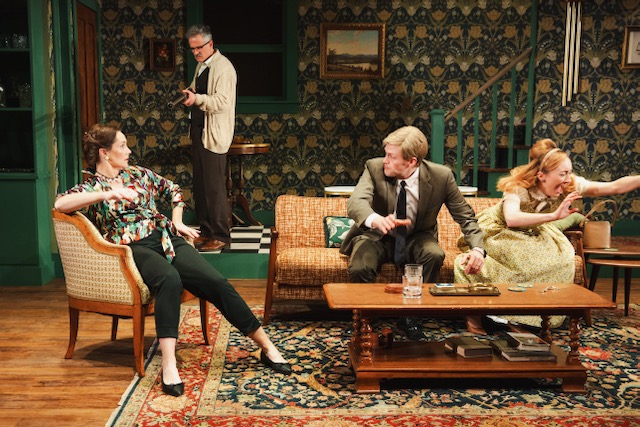Above: From left, Jeanine Kane (Martha), Tony Estrella (George), Gunnar Manchester (Nick), and Gabrielle McCauley (Honey) during a particularly fraught moment of ‘Who’s Afraid of Virginia Woolf?’ Photo by Cat Laine
It should be mentioned more frequently that our most cherished beliefs and comfortable roles are often but elaborate delusions constructed to avoid or forestall shame and disappointment, life’s one enduring currency. Those expectations and ambitions are cruel masters as the characters in the Gamm Theatre’s production of Edward Albee’s Who’s Afraid of Virginia Woolf? discover over the course of the evening, which might be cheekily described as a long night’s journey into truth.
Albee’s play is a giant of post-war theater and a stage staple because of both its quality and continued relevance, not to mention an absolutely crackling film adaptation every bit the equal of Tennessee Williams’ Cat on a Hot Tin Roof or Streetcar Named Desire. Its relevance is tied in part to its collegiate milieu and the seldom-discussed backroom politics of academia, which look a lot like the office politics of who-you-know.
In taking this play on, one naturally invites comparisons to all the prior iterations an audience member has witnessed and that’s likely to be several. Yet under the direction Steve Kidd, the Gamm’s up to the challenge, make subtle changes in tone and emotional starting point that distinguish it from other efforts, and they don’t miss a beat, offering a lively verbal counterpart to Fight Club, which shares the theme of delusional characters trying to come to rest while punishing those around them.
If the upper middle-class setting is important and rather unique for the time (versus those on the bleeding edge of epochal change, like Death of a Salesman), it’s also merely the playing field for a pair of storytelling stereotypes Albee gives the ultimate Prometheus treatment, the henpecked husband, George, and his better half, the shrewd and shrewish Martha. They tussle like heavyweights throwing reckless ruthless haymakers, unhappy until one, the other or both hit the floor. (John Darnielle channeled their vibe into a three minute song entitled appropriately enough, “No Children.”)
George, a associate professor of history at a small New England liberal arts college, may have once teemed with promise, but after a series of disappointments (unpublished novel) and setbacks (oafish behavior) seems to have accepted his fate variously as “a big fat flop,” and a “bog,” according to Martha, the daughter of the university president. George’s failure to impress her father has stalled his career, but her pain feels equally informed by her father’s (reportedly) yawning indifference toward her; perhaps her acting out now is an echo of this primordial backstory.
Martha in particular feels emblematic of a time when smart women were afforded few creative outlets and professional possibilities, consigning them to life in the shadow of their husbands and family. Her frustrations then are not just with George or their childless marriage, but the system, internalized into a nihilistic void of self-hatred she credits George with miraculously putting up with – in a moment of telling emotional lucidity – before she pushes their relationship past its breaking point during their ever ongoing game of chicken.
Innocent newlywed couple, state swim champ/high school quarterback Nick and his wife ditzy Honey have walked into this passive-aggressive demolition derby, disguised as the nightcap-lined after party to a college faculty mixer. The evening passes nearly in real time, one of the true joys of this play, as the playful arc of inebriation grows darker the longer it continues until the scene spontaneously disassembles in a sobering climax as sure as the train follows the whistle.
They share their own dirty secrets, but their characters are more thinly drawn and frankly don’t have the same stakes as Martha and George, who appear to have been building toward this evening’s culmination for at least two decades.
Indeed, the arrogant blond jock and the low wattage plain Jane, whose hysterical pregnancy entrapped him, are almost embarrassingly thin characters. Compare that to their host’s sadistic dance which resembles nothing in its emotional complexity and incipient violence so much as Oberyn Martell versus the Mountain in GoT. Spoiler Alert: It’s a bloodletting.
The production allows artistic director/actor Tony Estrella to take on the role of George after playing the Nick role in a Gamm Production earlier in his career. Compared to the film version, George starts the play on closer to equal footing with Martha, and you almost immediately begin to wonder which is the audience and which are the Gladiators. In this sense, it’s a post-modern play driven by momentum-like beats as Martha and George vie for the upper hand, with their guests almost reduced to props (which fits their lightweight nature).
After years of engaging in this back and forth, there’s an odd roteness to the battle, at least at first, and that’s the bait. Two people battling with their wits and caustic storytelling asides growing in its diminishing disdain. Therein lies the subtle majesty of the play because it’s just four people trying to control the narrative rather unsuccessfully, which isn’t that much of a plot, quite honestly, but when you see four people compete for some semblance of dignity like it’s capture the flag, this dignity they seek takes on a very questionable shape. To their credit, the entire cast is up to the battle.
Like a long evening of drinking, the length becomes a small issue by the end. The raised voices and obsessive concern over how others see oneself can have the claustrophobic feel of a three-hour Curb Your Enthusiasm episode. It’s certainly an enjoyable ride, but you are aware at times of the distance you’ve traveled just because of the emotional geography covered.
The set design of Martha and George’s fading old Victorian living / drawing room feels like a lost picture postcard from Norman Rockwell’s more idealistic age, now yellowing around the edges, and everything goes along quite well at least through most of the second act.
At times the high pitch of dramatic scenes doesn’t give the audience enough space for breath, but more so, the ending felt beholden to an era-specific labored form of dramatic gravitas, akin to the ‘60s over-reliance on reaction shots, which drew out the concluding denouement too much. It’s a subtle thing and the sole quibble from a sterling production that does justice to not only the great original material, but changes the emotional beats and starting points in novel ways compared to other productions.
You’ll be hard-pressed to find a 60-year-old play that feels as true today as then. We may have terms like codependency, gaslighting and emotional abuse but that doesn’t change how time can wear away our defenses and leave us scrambling away from hard truths as a relationship begins to fray into a compendium of slights and thwarted emotional expression beneath the spotlight of social expectations that yoke us to hierarchies that hardly serve anyone.
The play has extended its run to Feb. 25. Buy tickets HERE.
Chris Parker is a freelance journalist (The Guardian, Undark, Daily Beast, Billboard) and author of the book, King James Brings The Land a Crown, about the Cleveland Cavaliers’ 2016 championship. He lives in Providence.






 Subscribe
Subscribe